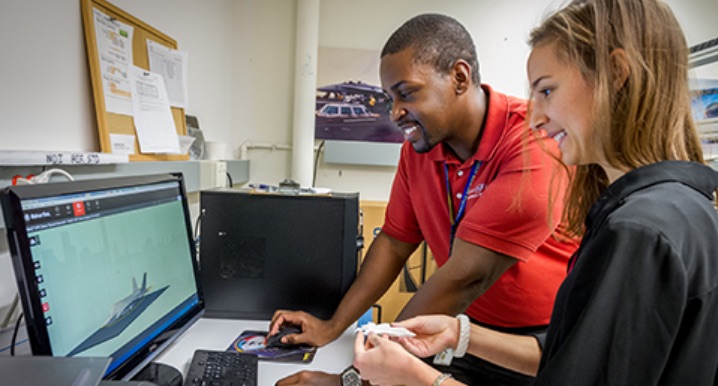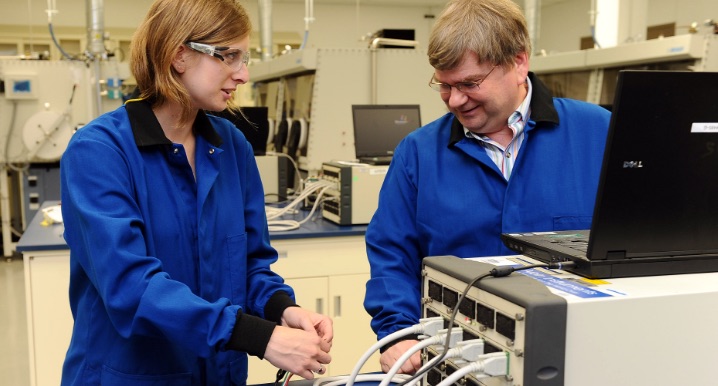Are You Interested in Engineering?
Engineers use science and math to design and build solutions to complex problems. These can range from small things, like rotating the screen of a phone when it’s turned sideways, to large things, like making air planes more fuel efficient. With more than 100,000 military and civilian engineers, the DoD is the largest employer of engineers worldwide.
“I would always take things apart as a kid and hopefully put it back together. Eventually I realized I could get paid for that so I jumped into engineering.”
Adith Subramanian
Naval Surface Warfare Center
Indian Head Division
Types of Careers in Engineering
Aerospace Engineer
Agricultural Engineer
Alternative Energy Engineer
Architectural Engineer
Automotive Engineer
Bioengineering
Biofuels engineer
Biomechanical Engineer
Biomedical Engineer
Ceramics Engineer
Chemical Engineer
Civil Engineer
Computer Engineer
Electrical Engineer
Geological Engineer
Geomatics Engineer
Health and Safety Engineer
Industrial Engineer
Manufacturing Engineer
Marine Engineer
Materials Research Engineer
Materials Science Engineer
Mechanical Engineer
Mechatronics Engineer
Microelectronic Engineer
Mining Engineer
Nanotechnology Engineer
Nuclear Engineer
Optical Engineer
Paper Engineer
Petroleum Engineer
Photonics Engineer
Robotics Engineer
Software Engineer
Structural Engineer
System Safety Engineer
Systems Engineer
Plus Many More!
Engineering Jobs in Action at the DoD

“I like trying different things and I have to learn through doing,” says Dr. Juhl. “My advice is to take every opportunity available, such as internships. Try it to see if you like it or not and build on that experience. Take things that are thrown at you and you’ll find your way.”
Dr. Abigail Juhl
Dr. Abigail Juhl
Materials Research Engineer
Materials and Manufacturing Directorate, Air Force Research Laboratory
The Air Force has lots of reasons to control mechanical waves, including low-frequency waves, sound waves and low-frequency vibrations. In addition to these waves, Dr. Juhl and her team research medical ultrasound waves as well as how to control how air flows over the surface of a wing. She says the plethora of opportunities available to materials scientists makes it a solid career choice. Besides research or teaching, materials scientists can forge careers in patent law, professional journal writing and editing, sales, venture capital and new technologies, to name a few.
In 2020, Dr. Juhl was recognized by the DoD Office of the Deputy Director of Defense Research and Engineering for Research and Technology with the Laboratory Scientist of the Quarter Award. She was also awarded the Air Force Research Laboratory Early Career Award.
Learn More About Engineering Through These Opportunities

Camp Invention
National Inventors Hall of Fame (NIHF) offers Camp Invention, a STEM summer camp program for grades K-6 that turns curious kids into innovative thinkers. With support from DoD STEM, NIHF brings Camp Invention' to military-connected students in locations near DoD laboratories and facilities.

Air Force Research Laboratory Scholars Program
The Air Force Research Laboratory (AFRL) Scholars Program offers paid internship opportunities for undergraduate and graduate students pursuing STEM degrees. Interns work directly with AFRL scientists and engineers on cutting-edge research and technology.

Science and Engineering Apprenticeship Program
The Navy's Science and Engineering Apprenticeship Program offers high school students an eight-week paid summer research project at various Department of the Navy laboratories. Students gain real-world, hands-on experience and research skills while being exposed to DoD science and technology.